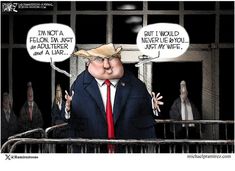 |
| Donald Trump paid $130,000 to Stormy Daniels with laundered money he used from his campaign funds, giving the dough to Michael Cohen as payment for legal services, who then paid it out to Stormy. Obviously, Trump was cheap. Clearly, tRrump did not pay Stormy nearly enough and his underhanded illegal deal is now exposed for what it was- bribery for sex (and, by the way, while his wife Melania was pregnant and giving birth to their son!) |
Pick any news outlet—Times, Fox, Breitbart. It’s always the “hush-money case.” Here’s a concept you can sell. Epsteins, Weinsteins, Charlie Sheens. It’s easily comprehensible, onomatopoeic. Hush. (Okay - "onomaopoeic"? In other words, nearly universally understood because "hush" is a stand alone word, in describing itself.)
Indeed, the term is sultry, lubricious; typically what’s being hushed is evidence of sex. Unlike the confidential legal settlement or the corporate N.D.A., hush money carries a whiff of the entrepreneurial. When Joseph Addison and Richard Steele started The Tatler, in 1709, they courted it. “I expect hush-money to be regularly sent for every folly or vice any one commits in this whole town,” Steele wrote. He was the first to employ the term but not the practice; for about as long as people have been saying stuff, others have been paying them not to. In Genesis, the King of Gerar tries to seduce Abraham’s wife, then pays him off with sheep, oxen, and servants. The King calls it “a covering of the eyes.” See nothing, say nothing.
What’s the going rate these days for silence? Inflation doesn’t compute precisely for sheep and oxen. Michael Jackson paid two hundred million. Bill Cosby paid three and a half, Bill O’Reilly forty-five. The sum depends on what you’re trying to hush up.
When Bette Davis’s husband recorded her in bed with Howard Hughes, she paid him seventy-five thousand dollars to keep it private. Jerry Falwell, Jr., provided the pool boy, whom Falwell liked to watch in bed with his own wife, with around two million. (Michael Cohen, Trump’s fixer, helped broker a deal.) Rudy Giuliani, in his capacity as Trump’s lawyer, once offered a mathematical model. “I never thought a hundred thirty thousand was a real payment,” he said, of the sum Trump paid to Daniels. “It’s a nuisance payment. When I settle it as real or a real possibility, it’s a couple million dollars.”
“That’s a preposterous statement,” the victims’-rights lawyer Gloria Allred said last week, when solicited for an expert opinion. “It’s not like buying a car.” A few years ago, Allred was criticized in the Times for negotiating a confidentiality settlement between a client and Harvey Weinstein. In response, she noted that the settlement didn’t preclude criminal charges; it was just a modicum of justice. She thought “hush money” conveyed the wrong message. “It’s a negative term,” she said. (William Safire called it “always strongly pejorative.”) “There’s nothing inherently wrong, and there’s a lot that’s right, when two people want to settle a matter.”
Through the ages, hush money has nevertheless been associated with dirty dealing. Thucydides hinted at it disapprovingly, Dickens scorned the payee more than the payer, Dostoyevsky viewed it as a transaction on the road to Hell. Sweeney Todd was hit up for hush money by his tonsorial rival; he slit the guy’s throat instead.
In the real world, the power dynamics are often lopsided. An alarming number of silencers are Presidents and their ilk: Hamilton, Jefferson, John Edwards. J.F.K. paid hush money of sorts, in the form of political capital, to J. Edgar Hoover, who’d discovered one of his affairs. Warren Harding sent hush money every year to a spurned mistress in possession of his love letters, which featured recurring characters that included Jerry the Penis. “Wish I could take you to Mount Jerry,” Harding wrote in one. “Wonderful spot.”
On the Watergate tapes, discussing the burglars, Nixon may have uttered the phrase “hush money” to his adviser Charles W. Colson, or maybe just something that sounded like it. (“Shush, honey”?) Decades later, Trump was recorded discussing a different mistress with Cohen. Was that Trump saying “Pay with cash”? Giuliani, never one to self-hush, argued on Fox News that Trump actually said, “Don’t pay with cash.” Giuliani explained that he had experience with surreptitious recordings: “How about four thousand hours of Mafia people on tape? I know how to listen to them, I know how to transcribe them. I’ve dealt with much worse tapes than this.” Folly, vice. Cover thine eyes.
What’s a wrongdoer to do? A call was placed to Eric Dezenhall, a crisis-management specialist who has advised such clients as the Sacklers and ExxonMobil and who has consulted on scores of secret settlements. “One of the things you hear is, It’s the coverup that gets you,” Dezenhall said. “That’s not true! This shouldn’t be taken as something I advise or support, but coverups work all the time.”
Of course, they work only if the public doesn’t hear about them. “Twenty years ago, if you wrote somebody a check to stay quiet, it would stay quiet,” Dezenhall said. “The problem today is people take your money, and then they go on TV anyway.” Not all of them, though. Who knows what Dezenhall’s clients—billionaires, celebrities—have kept hushed up?
Dezenhall does, but he couldn’t possibly say.




